Black Hole Eats Star: Student Charts Record Blast
Physics PhD student Eliza Neights was part of a NASA mission that recorded a gamma-ray burst, the most powerful class of cosmic explosions, that lasted for days.


For more than a century, the Department of Physics has attracted some of the nation's top scholars. Students build a strong foundation in nuclear physics, astrophysics and biophysics while studying advanced concepts, from quantum mechanics to optics. They also collaborate with faculty and partner institutions to understand the building blocks of life, observe exploding stars in distant galaxies and detect subatomic particles at the core of matter.
Study in the physical sciences at the George Washington University goes back to the founding of the Columbian College in 1821. Officially founded in 1912, the department has been a leader in scientific breakthroughs ever since, including hosting the historical 1939 conference at which Nobel Prize Winner Niels Bohr announced that Otto Hahn had successfully split the atom, thus ushering in the atomic age. Department faculty have included renowned scientists such as George Gamow, early developer and advocate of the big bang theory, and Edward Teller, famed for his work on the hydrogen bomb.
Today, the department carries on the practice of excellent research at state-of-the-art labs in Corcoran Hall and Science and Engineering Hall on GW's Foggy Bottom Campus. Faculty regularly secure competitive grants from the U.S. Department of Energy, the National Science Foundation, NASA and the U.S. Naval Research Laboratory. In the lab and in the classroom, the department is applying physics solutions to everyday life.
“GW has a diverse population. The student body comes from very different backgrounds. Even if your idea of fun is running computer modeling cell movement simulations, here you can find your tribe.”
George Sangiolo
BS '18, Biophysics


Black Hole Eats Star: Student Charts Record Blast
Physics PhD student Eliza Neights was part of a NASA mission that recorded a gamma-ray burst, the most powerful class of cosmic explosions, that lasted for days.
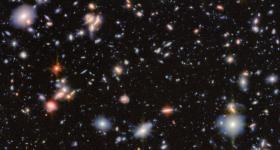
More Than Pretty Pictures: Space Telescopes Transform Science and Society
GW faculty explored how images from the Hubble and James Webb telescopes reshape science and influence policy, priorities and public perception.
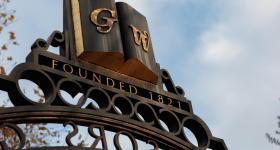
George Washington University senior Olivia Nippe-Jeakins, a physics major, received the Universities Space Research Association (USRA) Distinguished Undergraduate Award.

Ask a GW Expert: Alexander van der Horst on Friction and Tennis Courts
Alexander van der Horst, chair of the Physics Department, explains differences among tennis court surfaces as the U.S. Open tournament gets underway.
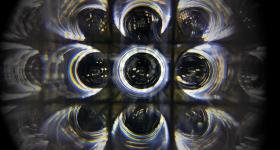
Big science at the smallest scale
GW experimental physicists are pioneering big science at the smallest scale. With cutting-edge tech and state-of-the-art systems, faculty and students are on the frontlines of a subatomic revolution.
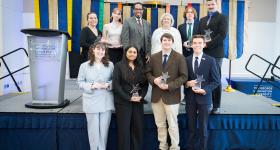
GW Recognizes Top Scholars at 2025 Academic Honors Ceremony
President Granberg and Provost Bracey congratulated the students who earned Outstanding Academic Achievement Awards, as well as nine Distinguished Scholars. Quinn Stefan, Physics major, was one of...
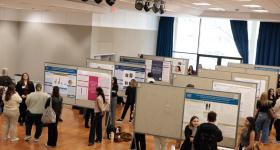
CCAS Showcase Spotlights Student Research: 20 physics projects were presented
More than 200 undergraduate and graduate students across disciplines displayed their scholarly work at the third annual CCAS Research Showcase.
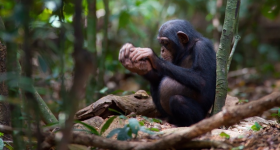
GW Anthropologists and Physicists Researching Primates’ Wooden Tech
A team including GW anthropologists and physicists are working in forest field sites and campus computer labs to fill a blank page of the archaeological record.
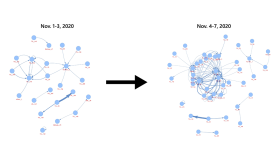
Study: Presidential Elections Bring Online Hate Communities Together
Neil Johnson, Professor of Physics, co-authored the study "How U.S. Presidential elections strengthen global hate networks"
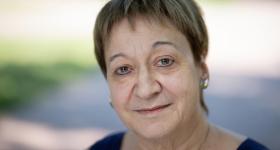
GW Physics Professor Received Lifetime Achievement Award
Professor of Physics Chryssa Kouveliotou, a pioneer in the field of astrophysics, is the recipient of the Astronomical Society of the Pacific’s (ASP) most prestigious award, the Catherine Wolfe Bruce...
